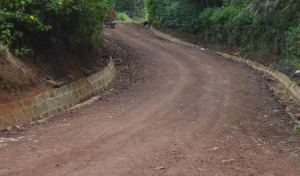Two years ago, the majority of residents of Gitimbine, Mjini, and Majengo, the underserved areas of Meru County, could not easily access crucial facilities like dispensaries, schools, and markets, especially in Meru town, due to the sorry state of the access roads at that time.
This, however, is a thing of the past, especially after Community Roads Empowerment (CORE Kenya), a Non-Governmental Organisation (NGO) with funding from the Japan Social Development Fund (JSDF), through the World Bank set foot in the area with a view to rehabilitating the 26 kilometres of roads connecting the 23 kilometres of existing Eastern and Western bypasses through the Do Nou technology.

Do Nou technology means using gunny bags with materials to improve sections of roads that are in dire need of repair or have been rendered impassable.
During a visit to some areas where the rehabilitation programme has been completed, residents who spoke to KNA registered their gratitude to CORE, adding that their presence has played a key role in opening them up to the outside world.
Mr. Sam Bundi, a resident of Majengo who uses Kaurone-Patmos Road, said he could now comfortably settle into his farming business with the assurance that his farm produce would easily be transported from his farm to the markets.
“This road has always been impassable when it rains. I remember I had to incur huge expenses after the vehicles I was using to ferry maize from my Shamba were stuck in the muddy road. I had to hire several young men to pull out the vehicle, and this ate into my profits,” said Mr. Bundi.
He said that the road’s drainage has been one of the impediments, but considering that it has been fixed, transportation along the roads will be smooth.
“We thank CORE for the good work, and we are looking forward to more such projects, even if they will be tarmacking,” said Mr. Bundi.
Mr. Augustine Ouma, Manager at Patmos Hotel along the same road, said there have been challenges relating to the accessibility of the road, which translated to few clients for his business.
He said the rehabilitation of the road is already bearing fruit, as clients are increasing daily.
“We are grateful that this road was one of those earmarked for rehabilitation. The works on it have been so well done, and our clients are not worried even if it rains, as they are sure of the accessibility to the hotel and the nearest tarmacked road,” said Mr. Ouma.
Mr. Wilson Murithi, a resident of the Gitimbine area, said the rehabilitation of Tungi Road has been a game-changer for the residents in terms of economic activities.
He said that unlike in the past, when the road was pathetic, farmers can now ferry their farm produce to the markets in Meru town and its environs without problems.
“The ease of transporting goods to the market has reduced the transportation cost, which means more money for farmers,” said Mr. Murthi, adding that the road has also enhanced security in the area due to frequent police patrols.
Mr. Benson Kirimi, a boda boda operator, said they do not have to take their motorcycles for repairs as frequently as they were doing before since the road is now smooth for use.
Also adding her voice, Ms. Doreen Makena said initially they were forced to take their little children to school to avoid them falling on the muddy road, which was also full of valleys.
“At the moment, we have reduced the number of times we wash our school-going children’s clothes as the road is no longer muddy, even during the rainy season,” said Ms. Makena.
A visit to Nchaure Primary School was also a clear indicator of the positive impact the rehabilitation programme had on the institution.
Ms. Mary Githinji, a teacher, told KNA that the school was on the verge of closure following the decreasing number of learners.
Among other factors that contributed to the decline in numbers, she said, poor road networks were one of them and affected both the learners and the teachers.
“Before the rehabilitation of this road, most of the learners had started transferring to nearby schools, while the teachers too were reluctant to be posted here. When CORE came, we requested that they extend the road to our gate, and this has played a key role in getting back students who had transferred to other institutions, even though this was the closest to their homes,” said Ms. Githinji.
CORE Coordinator Amos Biwott said the focus of rehabilitating the access roads is to avert a situation whereby people living in underserved areas can’t get access to the roads as they go to their schools, hospitals, and markets, among other areas of interest.
Mr. Biwott said the project mainly focuses on young people from underserved areas who engage in the improvement of the roads after training.
“The first component of the project entails the capacity building and sustainability of labour-based road maintenance technology in the targeted communities.”
“The other components are the enhancement of livelihood opportunities, effective project management, and monitoring and evaluation,” said Mr. Biwott.
During the first year, 2022-2023, 10.83 kilometres of the access roads were rehabilitated and 20 Small and Medium Enterprises (SMEs) registered, while in 2023-2024, 8.55 kilometres were rehabilitated and 15 SMEs registered.
The remaining 6.62 kilometres are set to be rehabilitated during the current 2024–2025 financial year.
By Dickson Mwiti





